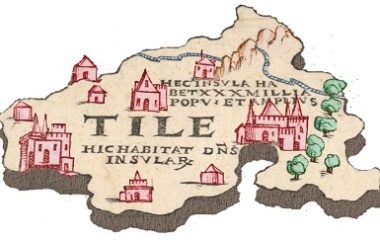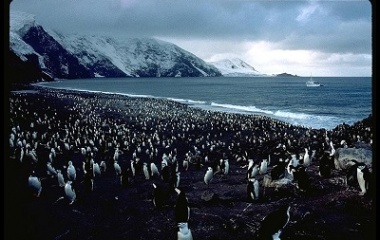What drove the ancient explorers to venture out into the dark, dangerous unknown? Was the pull of Ultima Thule, places beyond the borders of the known world, too much for them to resist? Without the courage and conviction of pioneers like Pytheas, we would never know of the existence of places like the mythical island of Thule.
What is Thule?
Thule (pronounced: thoo-lee) is the name given to a legendary island believed to be situated in the furthest north location explorers had ventured in the 4th century BC.
Where is Thule?
In ancient European cartography and descriptions, it is said to be in the northern regions, near Britain and Scandinavia, or to the north west, perhaps Iceland. Some sources cite Saaremaa (situated in the Baltic Sea) or possibly Greenland.
The Ancient Greek explorer, Pytheas, was the first to write about Thule during his travels between 330-20 BC. He was also one of the first to describe the effects of the moon on the tides, and to estimate the length of the British coastline, and was a specialist in longitude and latitude. Owing also to his skill as a sailor, he was chosen for the expedition. Pytheas left his home in Massalia (now known as Marseille) to travel north in search of tin from mines he had heard about in South Cornwall. He sailed to Britain and found the tin mines, then headed further north. He passed Scotland and visited the islands of the Hebrides, Orkneys and Shetlands. From there, he sailed further north for six days before he found the island called Thule.
Pytheas described the people of this island as barbaric; in other words, Germanic tribes. The people were simple farmers living on grain, roots and honey. They showed him where the sun set on the shortest day of the year and explained that in winter the sun did not rise at all. In summer, there was no night.
Phytheas – Explorer or Tail Spinner?
Since Pytheas’ work, On the Ocean, was lost, he was subsequently cited by other authors, but many of them became skeptical of his claims when no other accounts of Thule were available to corroborate his findings.
In 140 BC, Polybius, a Greek historian, cited Pytheas’ description of the Thule region as one where “there was no longer any proper land nor sea nor air, but a sort of mixture of all three of the consistency of a jellyfish in which one can neither walk nor sail, holding everything together, so to speak”. Yet he also describes Pytheas in another passage as one “who has led many people into error”.
In 77 AD, Pliny the Elder, Gaius Plinius Secundus, a roman author and philosopher, also cited Pytheas’ claim of the existence and location of Thule as along the most northerly parallel.
In 30 AD, Strabo, a Greek geographer, philosopher and historian, wrote about Pytheas’ account of Thule being “six days’ sail north of Britain, and is near the frozen sea”. He later doubts his accounts and claims that Pytheas may have been lying and “been found, upon scrutiny, to be an arch falsifier…” He adds that “…from the other writers I learn nothing on the subject—neither that there exists a certain island by the name of Thule, nor whether the northern regions are inhabitable up to the point where the summer tropic becomes the arctic circle”.
Later classic writers describe the island’s location as being north west of Ireland and Britain, or possibly Iceland or Scandinavia. In the Middle Ages, Thule was the name given to Iceland. Though authors in the Middle Ages did continue to cite ancient sources on the subject, they did know other islands existed in the regions to the north of Britain. These contrary accounts on the whereabouts and existence of Thule perpetuated the mythological and fantastical nature of the island.
In 2010, scientists from the Institute of Geodesy and Geoinformation Science in Berlin made a breakthrough with 2nd century maps of the area by scholar Claudius Ptolemy. The team of mapping and surveying experts discovered errors of scale and calibration in Ptolemy’s map, but were able to correct his errors. With their new calculations, they believed the location of Thule to be the Norwegian island of Smøla.
Hyperborea
Similarly to the legend of Thule, another legend told of a mythical place to the north. Boreas referred to the god of the north wind, and hyper means over. Hyperborea was said to be a paradise where the sun never set. It was believed that the people who inhabited both Thule and Hyperborea, according to ancient authors and philosophers, lived to be 1000 years old and lived lives of pure happiness.
In modern esoteric beliefs, Hyperborea was considered the center of civilization and spirituality or the origin of civilization. Some theories view Hyperborea as the original Garden of Eden. Further arguments from the same school of thought state that mankind has not evolved but rather devolved from its superior state. This premise extends to the possibility of Hyperboreans having been ancient astronauts from another planet!
Nazi Links
Ancient explorers and mythologists weren’t the only ones to buy into the notion of Thule. Nazi occultists also believed in the existence of Thule or Hyperborea. They considered it to be the birthplace of the Aryan race. The Thule Gesellschaft or society believed in Pytheas’ accounts of the island, and further described it as a land of giant “superhumans”. The inhabitants allegedly had magical and psychic abilities and possessed technology way beyond what exists in the current day. These occultists planned to save Germany by creating a race of Nordic Aryan Atlanteans!
Thule and Ultima Thule – Modern Usage
Today, the word Thule is used in relation to the Inuit Greenlanders. The name has also been used for three islands forming part of the South Sandwich Islands in the South Atlantic Ocean. In the USA, a cave system has also been named called Ultima Thule.
The term Ultima Thule was coined by Virgil, a Roman poet who died in 19 BC. The term means any distant place “beyond the borders of the known world” and has come to mean “distant region” in modern day definitions or “highest degree obtainable”.
The Ultima Thule of the mind was a subject John Henry Wilbrandt Stuckenberg considered to be of “transcendent importance” in 1885. He contemplated the eternal question of what or who created the universe, and vacillated between the spirit and matter as the originator. He concludes, however, that the all-encompassing explanation of the universe is science or matter.
Whether it be ancient myth, esoteric beliefs or science, Thule has drawn intrigue and curiosity for millennia. Man will always think outside the boundaries, contemplate his origins and abilities and reach into the unknown, the Ultima Thule. Without these fearless explorers taking us beyond the known world, we would never have any hope of reaching places like Mars or even further into the unknown, beyond the Solar System!











Thule is most probably the place we today call Doggerland. I find it interesting how many in this field think ancient stories are merely “myths, fables, legends, tales” etc… even the names of these stories are evidence to their elitist view points on ancient societies. I think there are many truths to these stories that may have become more made up as the years went by. Archaeologists don’t let mud deter them from the artifacts underneath so why not the same with these stories passed down through time?
Maybe I’m missing something? Is there a section of archeological academia dedicated to these stories? Is any importance given to them?
Yes, Both archeology and cultural anthropology investigate myths and their origins and meanings. Folklorists document and explore local variants of myths and cultural practices. Other disciplines like psychoanalysis and semiotics investigate the symbolism and unconscious meaning of myth. The statement that ‘…there are many in this field who think ancient stories …are merely myths…’ is certainly not my experience, nor is this passionate and exciting field of knowledge particularly elitist.